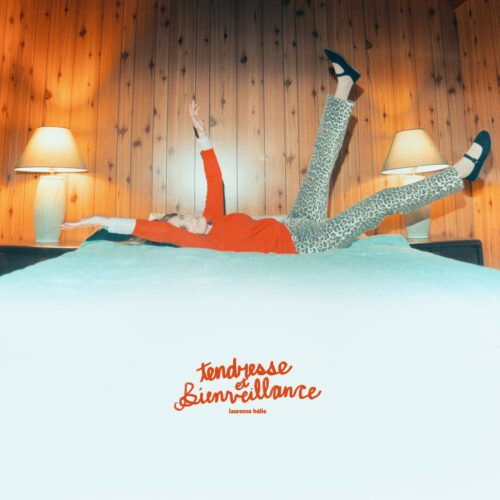Released on February 28, 2025, Laurence Hélie’s Tendresse et bienveillance EP marks a new beginning for her. After delivering two country folk albums in 2011 (Laurence Hélie) and 2013 (À présent le passé), she went into musical hibernation for several years. She then re-emerged under the pseudonym Mirabelle to bring us her album Late Bloomer in 2020 and her EP Flickering Lights in 2023. The music released as Mirabelle was more oriented towards an indie rock sound with a folk touch.
Now that she’s come full circle by returning to her original name, Laurence Hélie offers us a hushed, enveloping short set, marked by a desire to heal old wounds, to reflect on the path taken so as to move forward more lightly. Her melodious voice, linked to skilfully crafted instrumentations, takes us to inner landscapes, sometimes vast, sometimes intimate, imbued with the bittersweet ambience conducive to healing and reflection.
Tendresse et bienveillance, a soft-rock, almost downtempo piece, opens the EP and serves as the starting point for what appears to be a therapeutic approach. It’s about memories and distress signals. We feel a little in danger, as if everything isn’t quite right. That said, we’re left with the tenderness and kindness we need to show to others, but above all to ourselves, in order to begin the work.
Then, on Mes sympathies, Laurence addresses a person who has hurt her. There are contradictory feelings; an intimate attachment, almost an obsession, that coexists with a deep, latent resentment that’s hard to shake off. A track that feels like a kettle reaching boiling point.
In Last Chance Lake, we seem to be on a nature retreat to reflect and examine a difficult time. She seeks answers from medical professionals, a storm rages outside, something breaks. Nevertheless, the piece’s realization is marked by several luminous moments, such as the sun hitting the drops of water on the thorns of a conifer after the rain.
In L’arcane sans nom, she seems to be leaving this difficult period behind, picking herself up and moving on with a little more confidence. She seems to refer to her Mirabelle / Late Bloomer album as ‘late bloomer and false modesty’. As if she felt her Mirabelle pass wasn’t entirely authentic, or that she lacked the confidence to defend her material at the time. So, once again, the desire to move forward prevails.
Finally, in More Thrill, Laurence Hélie is now moving towards the future. The presence of a male voice and the text seem to indicate that she has found a partner or friend with whom she’s comfortable being the girl she’s always been. It’s also the realization that, as we age, we come to appreciate the quietude of routine and value tranquility. It’s still understandable to want a little excitement now and then.
All in all, Tendresse et bienveillance is a hushed, bittersweet album, very well constructed. It features a variety of instrumental choices (slide guitar, saxophone, bells, etc.) that always support the pieces without ever clashing. This is an album I’d recommend for a short road trip or a candlelit dinner.
























